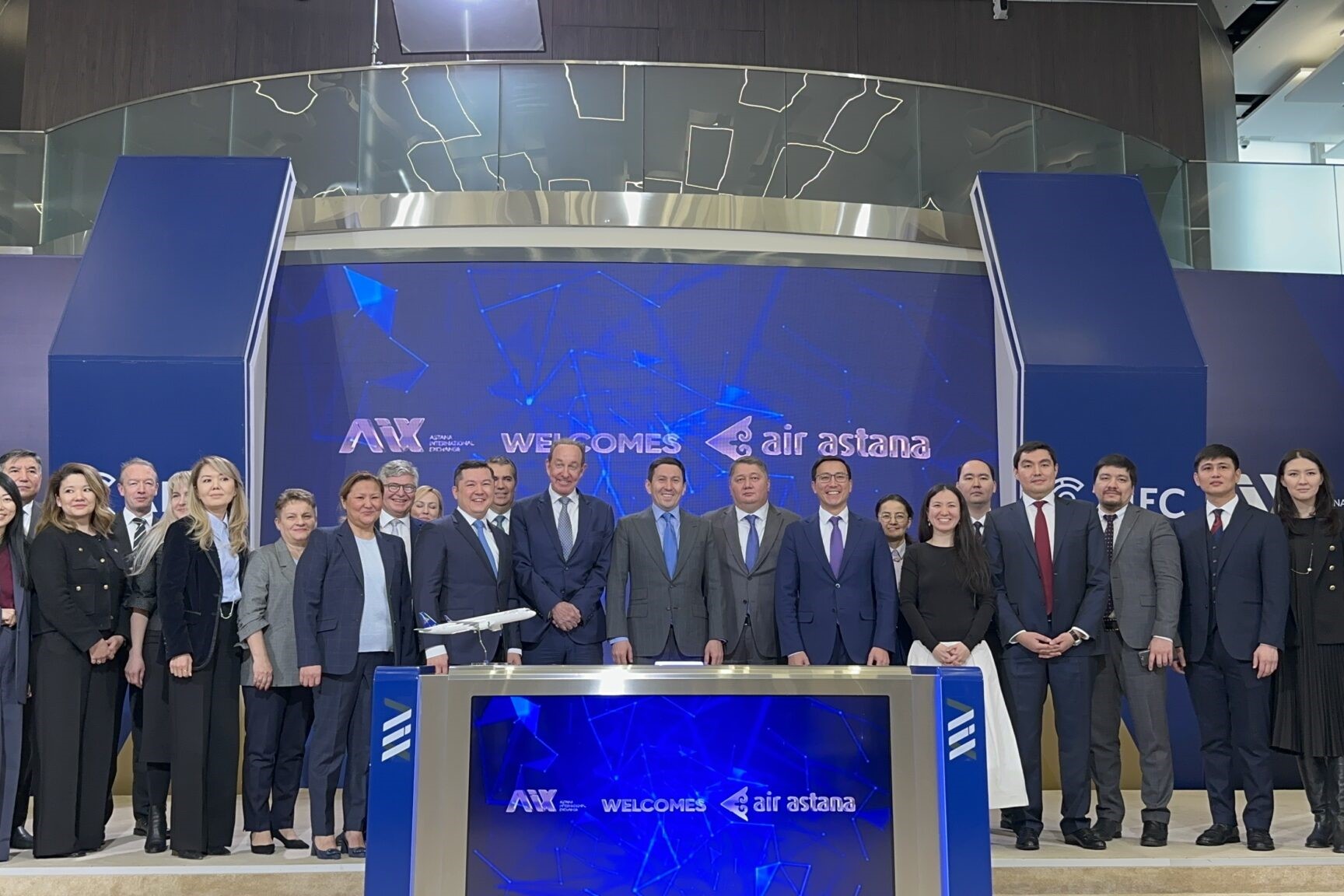This past week, the media paid attention to the announcement that Qazaq Air will be sold to a ‘strategic partner’ in the aviation industry, Kazakhstan’s announcement that five renewable energy projects (solar, wind, and hydrogen) will be completed by 2030, The World Bank announcing a financing package for Kazakhstan’s Digital Acceleration project DARE, Uzbekistan planning to introduce Chinese Electric Ambulances to its healthcare system, Tajikistani and Iranian ministers meeting in Tehran and setting goals for the strengthening of Persian language and commercial ties between the two countries, and the Taliban's envoy to Baku seeking expansion of trade relations with Azerbaijan.

Air Astana kicked off its IPO on the Astana International Exchange (AIX) on Feb. 15. Source: The Astana Times
Air Astana formalized its IPO on February 15 during an official ceremony at the Astana Stock Exchange, where it was announced that the company’s shares were valued at USD 215 million. The company subsequently began trading at the London Stock Exchange, a first for the Kazakhstani airline (Astana Times) and it became clear later on that it has raised about USD 370 million in IPO (BizMedia). The CEO of Air Astana, Peter Foster stated that the money raised at the stock exchange will go towards a massive redevelopment project in infrastructure to further grow the company’s value. This week, the Chairman of the Board of the Samruk-Kazyna Foundation, the managing company of both Air Astana and Qazaq Air, announced that Qazaq Air would be sold to a ‘targeted strategic partner’ (Tengri News). No further details on the sale are available at this time, but the move is part of a larger effort to privatize assets held by the airline’s holding company (Tengri News).
On the energy front, Kazakhstan’s Senate announced this week the construction of a series of new renewable solar, wind and biofuel energy plants across the country by 2030. These renewable sources of energy in Kazakhstan would assist in President Tokayev’s goal of generating 30% of the country’s total energy from renewables by 2030 and 50% by 2050. Currently, only 5.97% of energy in Kazakhstan is generated from renewable sources, not including hydropower (Qaz Monitor). To support this plan, the Kazakh government has also initiated land surveys in the Mangystau region, along the Caspian Sea to begin the construction of a green hydrogen power plant by 2027, which will begin energy production by 2030. The power plant would be supported by wind and solar energy and would be part of a larger plan to export green energy to international markets (Astana Times).
In the meantime, the World Bank approved a USD 92,43 million financing package for Kazakhstan's Digital Acceleration for an Inclusive Economy (DARE) Project (World Bank, Astana Times). The objective of the DARE Project is to provide access to high-quality and climate-resilient broadband infrastructure in selected unserved and underserved areas of the country. The project comprises two components– The first component, resilient digital infrastructure, aims to finance the rollout of high-quality climate-resilient and low-carbon digital infrastructure in villages in four unserved and underserved regions of Kazakhstan (Akmola, Turkestanskaya, West Kazakhstan, and East Kazakhstan), connecting households, public institutions, and businesses to broadband. The second component, project management and implementation support, will support the management and implementation of project-associated activities, including procurement, financial management, monitoring and evaluation, project communications, as well as environmental and social safeguards and citizen engagement.
In Uzbekistan, a project worth USD 150 million was announced involving the purchase and import of Iveco Electric Vehicles for ambulance use (KUN). Chinese company Henan Costar Group will deliver the electric ambulances to Uzbekistan first to be used in test mode. If the trial period proves successful, a fleet of these electric ambulances will be purchased on an investment basis. Iveco electric vehicles reportedly boast a range of up to 450 km on a single charge, have a 10-fold rate of fuel savings, and crucially, demonstrate resilience to moisture and high temperatures.
Elsewhere in the region, Iran’s Deputy Minister of Cultural Heritage and Tourism announced the creation of a special task force with Tajikistan to develop cultural and linguistic ties in the Persian-speaking world. These proposed ties will include the development of educational exchanges and regional cultural forums between the two countries (Asia-Plus Tajikistan). Likewise, this week, Iran and Tajikistan formalized a trade protocol under the auspices of the Shanghai Corporation Organization (SCO) to further economic ties between the two countries. This includes the formalization of a multilateral trade agreement between Tehran, Dushanbe and other SCO member states, as well as opportunities for Tajikistani businesses to invest in Iran (Ministry of Foreign Affairs Tajikistan).
Lastly, the Taliban’s new ambassador to Azerbaijan, Mohammad Abbas Stanikzai, announced that his country would seek to enhance ties in a forum with Azeri officials in Baku, citing that his country wanted to develop ‘balanced’ and “good relations with all countries” in the region (Ariana News). In response, Azerbaijan expressed its willingness to pursue further cultural, economic, political and trade ties with Taliban-controlled Afghanistan, increasing the trend of de facto recognition of the Taliban’s control over Afghanistan (Pajhwok).

